
Éducation
En collaboration avec des partenaires communautaires du monde entier, nous pouvons créer un changement significatif pour les enfants, les jeunes et les communautés — en améliorant l'éducation et l'accessibilité et en réduisant la violence, en particulier à l'égard des filles.
Chaque don compte et cet hiver, chaque don sera doublé grâce à un programme de dons jumelés de $10 000 !
Éducation, pouvoir des jeunes
Notre partenaire, l'Institut pour les initiatives rurales (IRI), a été fondé il y a 15 ans sous le nom d'Ograda Noastra (Notre cour) dans la petite ville de Cahul, dans le sud-ouest de la Moldavie. L'IRI se concentre sur le développement de la culture civique et l'augmentation des opportunités économiques pour les enfants et les familles des communautés les plus pauvres de Moldavie, c'est-à-dire les communautés rurales.
La Moldavie est le pays le plus rural d’Europe. Même par une journée brumeuse et froide comme celle-ci en novembre, les crêtes vallonnées et les petits villages qui parsèment le paysage sont indéniablement beaux, mais le niveau de pauvreté est également très clair. L’IRI sait que l’avenir de la Moldavie dépend du développement de ces zones rurales, peu importe où elles se trouvent.
L’IRI est un bon exemple d’organisation en constante évolution : elle a adapté son approche du développement communautaire au fil du temps. Différents villages, différents enfants, différents maires et administrateurs d’école ont des identités différentes, et le personnel de l’IRI est devenu très efficace pour établir des relations et identifier rapidement les moyens de les nouer.
Ils ont aussi appris à être patients. Tatiana Costev et Ruslan Stanga, codirecteurs exécutifs de l’IRI, m’expliquent avant notre visite à Gaidar, notre premier village de la journée : « Quand nous sommes arrivés pour la première fois dans cette communauté il y a cinq ans, ils pensaient que nous étions des espions américains. »
Mais ce que j’ai vu aujourd’hui, c’est une relation fondée sur le respect et la confiance. Nous avons rencontré le maire, les responsables de la jeunesse et d’autres responsables de la ville. Alors que nous parlions des possibilités de tourisme rural et d’idées d’activités pour les jeunes, de plus en plus de responsables de la ville et des villes voisines arrivaient, saluant chaleureusement Tatiana et Ruslan.
[image_caption caption=”Joe rencontre des jeunes leaders à Baurci, en Moldavie, qui ont collecté des fonds pour transformer une partie d’un bâtiment communautaire en salle de sport pour les jeunes.” float=””]

[/image_caption]
Selon Ruslan et Tatiana, la ville de Gaïdar a beaucoup évolué en cinq ans. Gaïdar se situe en Gagaouzie, une région autonome du sud de la Moldavie dont la composition ethnique est différente de celle du reste du pays. Ruslan m’explique que la Gagaouzie a souvent été négligée par les programmes et l’aide du gouvernement et que les Gagaouzes sont souvent la cible de discriminations politiques et économiques.
Mais pour Ruslan et Tatiana, pour avoir un espoir de construire une Moldavie prospère, toutes les régions du pays doivent avoir accès aux mêmes droits de l’homme et aux mêmes ressources que les autres régions du pays. Lorsque les gens lui demandent pourquoi l’IRI s’efforce de soutenir les communautés gagaouzes, il leur répond simplement : « Parce que nous sommes tous Moldaves. »
A Gaidar, dans le cadre de son approche diversifiée du développement communautaire, l'IRI a encouragé les jeunes de la région à demander de petites subventions et à les utiliser pour améliorer les espaces verts de la ville. Les responsables municipaux sont très ouverts aux recommandations de Tatiana et de Ruslan, qui les incitent à se lancer des défis et à se fixer des objectifs ambitieux pour le développement de la ville.
D'après mon expérience de vingt ans de voyage dans l'ex-Union soviétique, l'ouverture d'esprit et la volonté des responsables municipaux de travailler dur pour lever des fonds afin de correspondre aux petites subventions de l'IRI sont très inhabituelles.
Ce niveau d’ouverture s’est encore manifesté à Baurci, une autre ville de la région autonome de Gagaouzie. Dans cette ville, les élèves de l’école avaient reçu une petite subvention de l’IRI et avaient versé une somme équivalente à cette subvention afin de rénover une salle du bâtiment communautaire qui sert désormais de salle de sport pour les jeunes. C’était magnifique. Lors de cette réunion, les enfants ont activement discuté avec l’IRI et moi-même, ce qui montre clairement qu’ils se développent en tant que leaders communautaires et qu’ils ont déjà transformé leur communauté en un meilleur endroit où vivre.
Photo d'en-tête : Des jeunes présentent leurs histoires lors du premier Congrès de la jeunesse rurale de la République de Moldavie, un événement organisé par l'Institut des initiatives rurales en novembre 2019. © Institut des initiatives rurales

